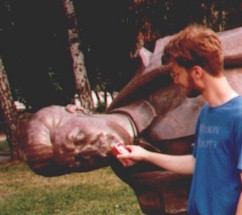Jesse Walker is books editor of Reason. He is author of the books Rebels on the Air: An Alternative History of Radio in America and The United States of Paranoia: A Conspiracy Theory. Here is interview with him.
How did you become a libertarian?
I’ve always had an anti-authoritarian side, but I didn’t really become a libertarian until my teens. My parents are liberal Democrats, and I had absorbed that outlook as a kid, moving further leftward as I got older. Around the 11th grade or so, I started reading free-market economists and found them persuasive, even as some of my other opinions were not what you’d commonly hear from a pro-market person at all. I remember telling a friend, “I think I’m getting more left-wing and more right-wing at the same time.”
What’s your relation with anarchism and how you see the relation between
anarchism and libertarianism today?
Reading the anarchists was part of that teenage evolution. I was interested in radical change, but I didn’t want any kind of radicalism that would lead to something like the Soviet Union, so it was natural that I’d check out writers like Peter Kropotkin and Benjamin Tucker and Colin Ward. One anarchist book that helped steer me towards economic individualism was Ursula LeGuin’s novel THE DISPOSSESSED — probably not the effect she meant for that book to have, but it’s not a completely crazy reading of the text. The protagonist does shake up a stultifying society by bringing in a little competition.
I was sympathetic to a lot of what I was reading in those books, which isn’t to say I embraced every position they took. I remember reading an Alexander Berkman book in high school and nodding along with a lot of what he said, but also thinking that his arguments about crime drying up under anarchy seemed pretty vague and naive. And his argument that productive property should be held in common because all labor is social was…well, let’s just say I thought a few steps in the argument were missing.
Getting to the second half of your question: The relationship between anarchism and libertarianism is that they overlap. Not all libertarians are anarchists and not all anarchists are libertarians, but there’s an intersection.
Ron Paul had a strange coallition of supporters that I like to call the
Rainbow Coalition of the right. Could this coalition survive after Ron
Paul?
It already is, isn’t it? I mean, Paul’s still around, but he isn’t running for anything, and his various sorts of supporters are still finding things to work together on. And not just the stuff they associate with Ron Paul.
Left libertarianism had great icons like Karl Hess with his project of
libertarian communes, Robert Anton Wilson with his anti-authoritarian
literature and SEK III with his counter economic. How do you see its
present?
There are many different definitions of “left libertarianism” out there, not all of them compatible with each other. But these days when I hear the phrase “left libertarian,” the first group that comes to mind are the C4SS people. They’re certainly the group most likely to simultaneously be fans of Hess, Wilson, and Konkin. Though even there you can see separate threads that under other circumstances might not be closely entwined. There are libertarians who are interested in C4SS-style economics but who aren’t so crazy about their cultural concerns, and vice versa.
At any rate: Broadly speaking, the project of combining libertarianism and the radical left is probably more popular right now than it’s been since the ’70s. The Internet has made it a lot easier for people with those leanings to find each other, and a lot of them did just that, especially after the Ron Paul boom of 2007-08 brought a lot of new people into the libertarian movement.
El Alto and Kurdistan are according to your wrintings radical examples
of self organization. Could these mean that anarchism is working well?
I don’t think I’ve ever described Kurdistan as a radical example of self-organization. I wrote Anarchy in Kurdistan that mentioned the Bookchinite experiments out there, but it didn’t try to assess how well they’re working. It linked to both supporters and skeptics and let readers muddle through the contending accounts for themselves.
I certainly hope the supporters are right. While I’m not a huge Murray Bookchin fan, Bookchinism is certainly far preferable to the other major ideological contenders in that corner of the world.
El Alto is another matter. The self-organization there, and in other places built by urban squatters, is pretty amazing. And yes, it really is very anarchistic, though of course it’s embedded in a larger statist system.
After writing The United States of Paranoia. Do you think libertarians
are more paranoid than regular americans?
We tend to be more paranoid about the government, and we tend to be less paranoid about the things that the government is paranoid about. So let’s call it a wash.
Are you thinking in write another book?
Yeah, but I’m not ready to talk in public about it yet. I’m still doing some preliminary reading and figuring out if there’s a full book in the idea.


Pingback: Talkin’ Paranoia, Homeland Security, Anarchy, and More | Freedom's Floodgates
Pingback: Talkin' Paranoia, Homeland Security, Anarchy, and More | Michigan Standard